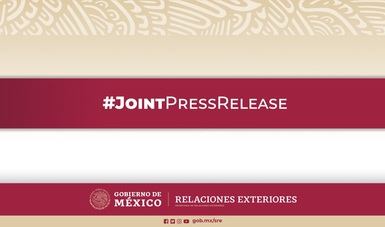- Today, Mexico submitted its observations to the report issued by the Committee after its visit to Mexico, carried out under Article 33 of the International Convention for the Protection of All Persons against Enforced Disappearances.
- The Government of Mexico is fully committed to cooperating on implementing and following up on the proposals.
- Mexico also reported on the actions it has taken since the November 2021 visit to address the Committee's recommendations.
- Mexico has created a National Monitoring Mechanism for International Recommendations on Enforced Disappearances and amended the law on the National Center for Human Identification. The property the center will occupy is being remodeled.
Today, based on Article 97 section 2 of the regulations of the UN Committee against Enforced Disappearances (CED), Mexico presented its observations to the Committee's report on its November 15-26, 2021 visit.
The visit, conducted under Article 33 of the International Convention for the Protection of All Persons from Enforced Disappearances, demonstrated Mexico's commitment to human rights and its openness to constructive dialogue and international cooperation.
While in Mexico, the CED delegation held meetings with 88 authorities and visited 13 states: Chihuahua, Mexico City, Coahuila, Mexico State, Guanajuato, Guerrero, Jalisco, Morelos, Nayarit, Nuevo León, Sinaloa, Tamaulipas and Veracruz. In addition to holding meetings with senior state authorities, they met with groups of victims and carried out search activities in the field.
In its report, the CED thanked the Mexican State for its valuable support, openness and constructive attitude during the visit, and for the readiness of the current administration to address the challenges related to this issue.
In its report, the committee also recognized the important legislative, institutional and judicial progress made in Mexico, such as adoption of the General Law on Enforced Disappearance of Persons, Disappearance Committed by Private Individuals and the National Missing Persons Search System; the General Law on Victims; creation of the National Register of Disappeared and MIssing Persons; reactivation of the National Search System; creation of local search commissions and Special Prosecutor's Offices for investigating enforced disappearances; adoption of the Homologated Search Protocol for Disappeared and Missing Persons and the Additional Protocol for the Search for Children and Adolescents, and the possibility of including those involved in searches into the Protection Mechanism for Human Rights Defenders and Journalists.
In presenting its observations and comments on the Committee's report, Mexico committed to cooperating to fully implement and monitor the 85 recommendations, which include, among other actions, the need to adopt a national policy to prevent and eradicate enforced disappearances and establish the minimum conditions for this to be effective.
In addition to responding to the observations, Mexico also reported on the first efforts to comply with the recommendations, including:
- The presidential initiative unanimously approved by Congress to reform the general law on disappearances and create the National Center for Human Identification, which will address the backlog that currently exists in the identification of bodies and remains. Adaptations to the building in Xochitepec, Morelos that will house the center began on August 9. In addition, new, duly equipped Regional Human Identification Centers are being created.
- Approval of the Guidelines for the Foreign Search and Investigation Support Mechanism (MAEBI) wherein all of Mexico's embassies, consulates and attaché offices operate as 'windows' for the families of disappeared persons in Mexico, so that they can report and denounce disappearances while in their country of residence, in addition to providing and requesting information and initiating procedures related to their rights as victims. This mechanism also allows the authorities responsible for the search and investigation to request support from Mexico's consulates and embassies to carry out activities outside of Mexico.
- The creation of the Monitoring Mechanism for International Recommendations on Enforced Disappearances.
This mechanism will create working groups to follow up on the international recommendations. It will be coordinated by the Interior Ministry in coordination with the Foreign Ministry, with the participation of all of the institutions involved in the issue of enforced disappearance, including the all branches and levels of government. The mechanism will coordinate national efforts to design a strategy to address the international recommendations on enforced disappearances. The process will include consultations with civil society, the families of disappeared individuals, search groups and international human rights organizations. The Interior Ministry will convene the meetings on this mechanism in late September.
The CED will review Mexico's observations and publish them on its web page, and will officially communicate to the Mexican government the date of the next report due the committee, which will be drafted within the Follow-up Mechanism for International Recommendations on Enforced Disappearances.
The Mexican State reaffirms its policy of openness to international scrutiny and collaboration with international human rights organizations, and its commitment to addressing the issue of enforced disappearances. It recognizes and supports the families of disappeared persons and the search groups.
